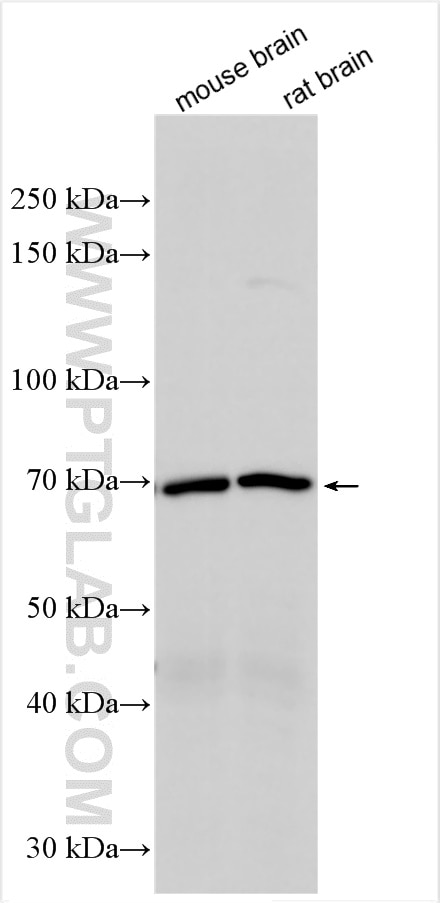Anticorps Polyclonal de lapin anti-VAChT
VAChT Polyclonal Antibody for WB, ELISA
Hôte / Isotype
Lapin / IgG
Réactivité testée
Humain, rat, souris
Applications
WB, ELISA
Conjugaison
Non conjugué
N° de cat : 27303-1-AP
Synonymes
Galerie de données de validation
Applications testées
| Résultats positifs en WB | tissu cérébral de souris, tissu cérébral de rat |
Dilution recommandée
| Application | Dilution |
|---|---|
| Western Blot (WB) | WB : 1:500-1:1000 |
| It is recommended that this reagent should be titrated in each testing system to obtain optimal results. | |
| Sample-dependent, check data in validation data gallery | |
Informations sur le produit
27303-1-AP cible VAChT dans les applications de WB, ELISA et montre une réactivité avec des échantillons Humain, rat, souris
| Réactivité | Humain, rat, souris |
| Hôte / Isotype | Lapin / IgG |
| Clonalité | Polyclonal |
| Type | Anticorps |
| Immunogène | VAChT Protéine recombinante Ag25153 |
| Nom complet | solute carrier family 18 (vesicular acetylcholine), member 3 |
| Masse moléculaire calculée | 532 aa, 57 kDa |
| Poids moléculaire observé | 70 kDa |
| Numéro d’acquisition GenBank | BC007765 |
| Symbole du gène | VAChT |
| Identification du gène (NCBI) | 6572 |
| Conjugaison | Non conjugué |
| Forme | Liquide |
| Méthode de purification | Purification par affinité contre l'antigène |
| Tampon de stockage | PBS with 0.02% sodium azide and 50% glycerol |
| Conditions de stockage | Stocker à -20°C. Stable pendant un an après l'expédition. L'aliquotage n'est pas nécessaire pour le stockage à -20oC Les 20ul contiennent 0,1% de BSA. |
Informations générales
SLC18A3 also known as VAChT, is the vesicular amine transporter family member. The SLC18A3 gene encodes a transmembrane protein that transports acetylcholine (ACh) into presynaptic secretory vesicles for release at cholinergic nerve endings in the central and peripheral nervous systems. Mutations in SLC18A3 are associated with congenital myasthenic syndrome(PMID: 27590285). The 68-70 kDa mature glycosylated form of VAChT can be detected (PMID: 14705140).
Protocole
| Product Specific Protocols | |
|---|---|
| WB protocol for VAChT antibody 27303-1-AP | Download protocol |
| Standard Protocols | |
|---|---|
| Click here to view our Standard Protocols |


